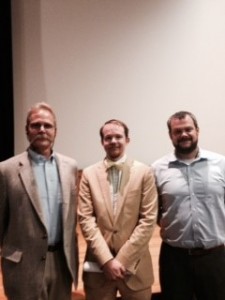
From left to right: Dr. David Dorondo, from WCU, Dr. Waitman Wade Beorn, Executive Director of Virginia Holocaust Museum, and Dr. Robert Ferguson, from WCU, after the lecture on the Holocaust in Ukraine, Sept. 17, 2015. Photo by Chad Grant.
Today’s society makes it difficult to picture a time when families were removed from their homes, separated from each other, forced into labor camps and often brutally murdered. Stories told by Holocaust survivors and scholars help us envision the horrifying events that plagued Eastern Europe just over 70 years ago.
Waitman Wade Beorn presented his lecture ‘A Deadly Hybrid: The Janowska Camp and the Holocaust in Ukraine’ to a packed audience at the A.K. Hinds University Center theater on Sept. 17.
Beorn used maps, photos and interviews of survivors to convey the immense loss of life and tragic events of the Holocaust in Ukraine. His lecture included descriptive stories about families and individuals living in the Janowska camp. These stories offered a look into the lives of both Jews and German soldiers.
Beorn expressed his hope that WCU students will be impacted by his lecture.
“It is always important to highlight for young people that the Holocaust was primarily an Eastern European affair. The situation in Ukraine is part of the Holocaust you probably never heard about in high school,” said Beorn. “Ukraine was a small but significant place during the much larger Holocaust.”
The Janowska camp was liberated by Soviets in July 1944. Of the 160,000 Jewish prisoners in Janowska concentration camp, only about 8,000 survived. Today the Janowska camp is used as a prison, factory and a pig farm. Many citizens of Ukraine consider this an insult to the Jewish religion.
Joseph Gravley, a senior at WCU and the president of the history club, said that WCU should bring similar speakers to campus in the future.
“This needs to be talked about so that it doesn’t happen again,” said Gravley about why Beorn’s lecture was so important to campus and community members.
Beorn developed a passion for relating information about the Holocaust and genocide while he was a student.
“I was in college taking a class about Nazi Germany and I needed a project topic. I was fascinated by an article about a group of Nazi doctors who were supposed to be doing good and were instead doing exactly the opposite. Looking into the German army inspired my first book,” said Beorn.
Robert Hunt Ferguson, Ph.D., explained his reasons for bringing Beorn to campus.
“Beorn is an excellent holocaust scholar. He’s won the Harvard book award for his last book ‘Marching into Darkness’,” said Ferguson.
Beorn received his PhD in History from the University of North Carolina-Chapel Hill and he works as the director of the Virginia Holocaust Museum and a consultant for the United States Holocaust Memorial Museum. He has published many works and journals discussing the Holocaust and genocide. His book, ‘Marching into Darkness: The Wehrmacht and the Holocaust in Belarus‘, explores the inhumane treatment of Jews by many members of the German army in Belarus during 1941. He won the Thomas J. WIlson prize for best first book from Harvard University Press.
Beorn describes his involvement with the Virginia Holocaust Museum as “pure luck.”
“My wife is a historian also and she got a job at UVA. We moved to Richmond, where the museum was looking for a director. It has been an interesting but different experience than being a professor,” said Beorn.
The Virginia Holocaust Museum aims to educate the public about the horrifying events of the Holocaust and preserve the memory of the lives lost. The museum was founded in 1977 by Mark Fetter, Al Rosenbaum, and Jay Ipson, one of Richmond’s youngest Holocaust survivors.


